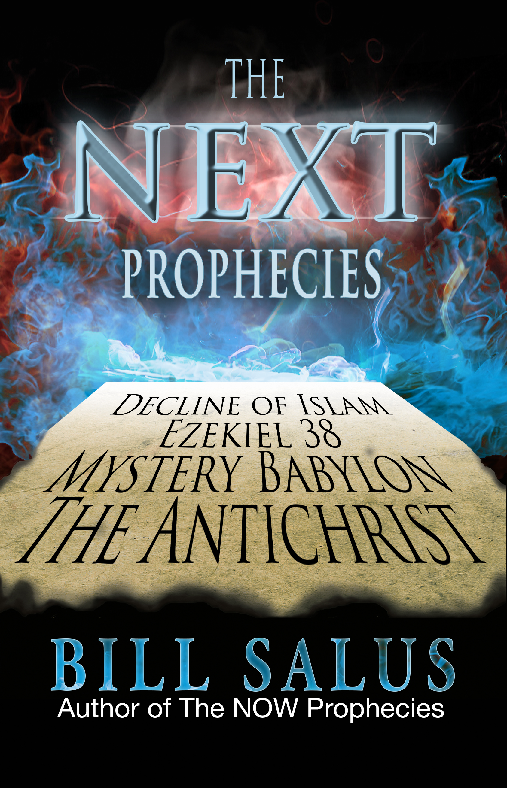Category Archives: Jesus
The Potential Pitfalls with the Traditional View of the Seal Judgments Part 1 – Bill Salus
This article is taken from a chapter in the Bill Salus book entitled, The Next Prophecies.
There is a dominant tendency in the prophetic community to place the opening of the seal judgments within the seven-year Tribulation period, a.k.a. Daniel’s Seventieth Week. This article series exposes some of the potential pitfalls with this traditional teaching and introduces an alternative view to the timing of the Seal Judgments.
The alternative view presents the possibility that the first five seal judgments are opened in a mysterious prophetic time-gap that exists between the Rapture and the Tribulation period. Although these five seals are opened in the gap, they find final fulfillment within the Tribulation period.
Introducing the Post-Rapture / Pre-Tribulation Gap Period
Before examining the seal judgments it’s important to introduce the Post-Rapture / Pre-Tribulation gap period. This time-gap begins in the immediate aftermath of the Rapture, which positions it in the Post-Rapture period. However, it concludes at the commencement point of the seven-year Tribulation period, making it a Pre-Tribulation interval.
Messianic Rabbi Zev Porat With Host Pastor Mike Spaulding On Soaring Eagle Radio
Friends, please visit Messiah of Israel Ministries page to see what our Father is doing through Messianic Rabbi Zev Porat in the land of Israel. Please join me in praying for Rabbi Zev and the work the Father has him doing their among the Jewish people.
Link to show – https://www.youtube.com/watch?v=IKe7Z82FwXk
Finding Balance in the Practice of Prophetic Study – S. Douglas Woodward
The prophetic scenario for the last days is generally built around several key issues. Certainly, one of those issues is whether Bible prophecy comprises predictions concerning future events or simply proclamations illustrating spiritual truths.
In some cases, the former sends us into unwarranted speculation while the latter may drive us into contemplative introspection, sometimes bordering on being self-absorbed. We must find a balance. The passionate inwardness that Kierkegaard identified as true faith must be balanced with the doing of social good as an expression of works of faith extolled by James. (James 2:20)
Allow me at this point to say that an authentic Christianity demands we heed both admonitions. If we deny future fulfillment of events portrayed in the Bible, our attentiveness to holy living could be curtailed. “And every man that hath this hope in him purifieth himself even as He is pure.” (1 John 3:3) However, if we commit to extensive conversations about future events and what the Bible has to say about them, our spiritual experience could suffer just as much when it comes to living out the commandments of Christ – daily – by failing to model the Kingdom of God through conducting our lives as if we did not know Christ.
No doubt: devotion to Christ should translate to a sincere contemplative piety. But it should also guard against overly self-indulgent spiritual disciplines in order that we do not forsake the local community of brethren and, more broadly, the needs of others. We must love God and love one another. “A new commandment I give to you, that you love one another as I have loved you.” (John 13:34) Jesus never taught that He would judge our commitment to Him based upon how well we have worked out the sequence of future events. Moreover, He instructed his followers to care for others not just prepare (i.e., “prep”) for cataclysmic events. Indeed, I have often wondered whether “prepping” could actually be justified given it betrays anxiety about tomorrow. “So, do not worry about tomorrow; for tomorrow will care for itself. Each day has enough trouble of its own.” (Matthew 6:34).
Still, as with any theological topic, we best, “Study to shew thyself approved unto God, a workman that needeth not to be ashamed, rightly dividing the word of truth.” (2 Timothy 2:15) Hence, in the final analysis, understanding Bible Prophecy is a worthy endeavor for several reasons: first, that we may be inspired by witnessing the fulfillment of prophecy – judging that the Word of God has been made surer;[secondly, encourage others in the faith; and thirdly, guard against false teachings that might lead less knowledgeable brothers and sisters astray.
The late Dave Hunt, in his book, The Woman Rides the Beast, offered this confirmation of the importance of Bible Prophecy to solidify beliefs and in some cases lead to saving faith:
There are many important reasons for Bible prophecy. First of all, prophecy fulfilled provides irrefutable proof for the existence of the very God who inspired the prophets. By foretelling major events of world history centuries and even thousands of years before they happen, the God of the Bible proves that He is the only true God, the Creator of the universe and mankind, the Lord of history and that the Bible is His infallible Word given to communicate His purposes and way of salvation to all who will believe. Here is a proof so simple that a child can understand it, yet so profound that the greatest genius cannot refute it.[1]
Peter testifies succinctly, “We have also a more sure word of prophecy; whereunto ye do well that ye take heed, as unto a light that shineth in a dark place, until the day dawn, and the day star arise in your hearts.” (2 Peter 1:19)
Of course, that “day star” (the “bright and morning star”) is Christ Jesus Himself: “I, Jesus, have sent mine angel to testify unto you these things in the churches. I am the root and the offspring of David, and the bright and morning star.” (Revelation 22:16)
The Spirit of prophecy is the testimony of Jesus. If our study of prophetic themes does not lead us into a closer walk with Him, we must question why we are study prophecy in the first place. At this, I fell at his feet to worship him. But he said to me, “Don’t do that! I am a fellow servant with you and with your brothers and sisters who hold to the testimony of Jesus. Worship God! For it is the Spirit of prophecy who bears testimony to Jesus.” (Revelation 19:10)
[1] Dave Hunt. A Woman Rides the Beast: The Roman Catholic Church and the Last Days (Kindle Locations 147-149). Kindle Edition.
Do As I Say and Not As I Do: The Tragedy of the James White Interfaith Dialogue and the Pragmatic Defense Offered by Phil Johnson
The current firestorm related to James White’s decision to facilitate an interfaith dialogue with Imam Yasir Qahdi is puzzling in the least and has become a stumbling block for many who do not understand how White cannot understand that he is “dancing with the devil” as the saying goes. Mr. White’s response to those critical of his decision has been the polar opposite of remorse and he has in fact dug his heels in and maintained that his actions were right and consistent with what Christians should be doing. Is that true? What bridges can be built to people who teach that Christians who do not submit or convert to Islam should be murdered? What madness is this that has gripped Christians today such that they believe the lie that building bridges to nowhere constitute evangelism? I won’t rehash all of Mr. White’s actions related to this in detail. You can read about that here – http://www.worldviewweekend.com/news/article/facts-reveal-james-white-islamic-dupe-clueless-evangelicals-are-desperate-save-his
What I wish to address is the support Mr. White has received. Surprisingly a couple of people with very different perspectives, one might say two people with theological beliefs very much at odds with one another, have stepped into the fray to defend Mr. White’s error. I am speaking of Phil Johnson and Michael Brown. This has added a layer of intrigue to the entire situation but has also served to obfuscate the truth of what critics of White’s decision to promote an interfaith dialogue have been saying. By engaging in what appear to be damage control activities on behalf of Mr. White, Johnson seems to have exposed himself as a hypocrite of the highest order. You can be the judge of whether or not that is true based on the information contained in this article. His previous statements seem to be completely contradictory to his stated position concerning James White’s ecumenicalism, or to use the new and improved phrase, interfaith dialogue.




